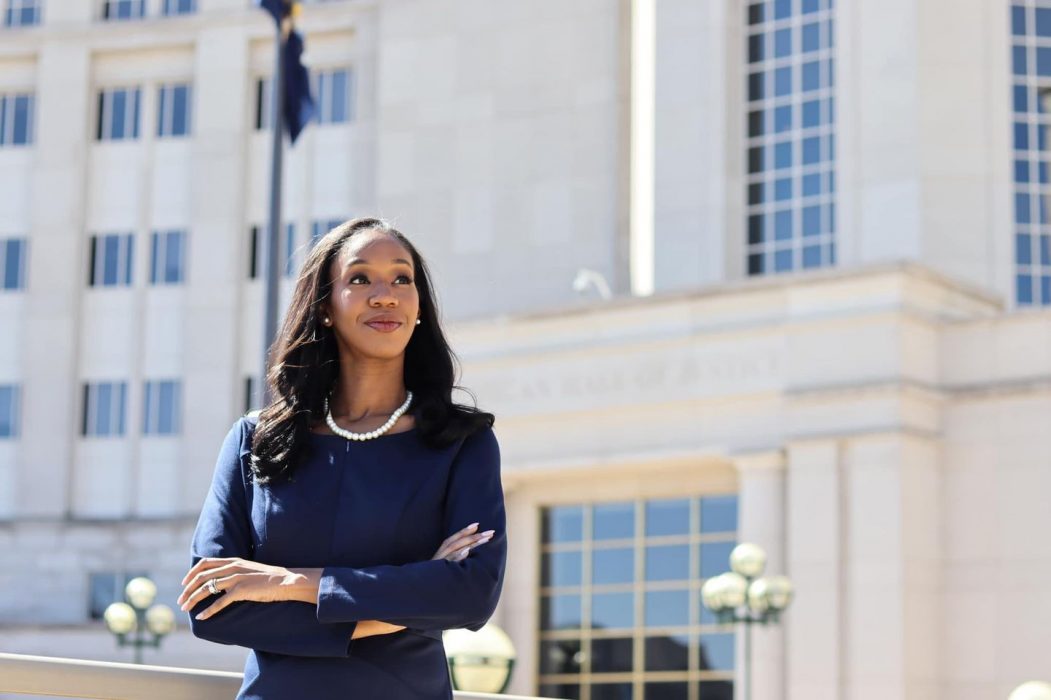
Article by MIRS News, for SBAM’s Lansing Watchdog e-newsletter
Rep. Kyra Bolden (D-Southfield) was announced Tuesday afternoon as the next justice of the Michigan Supreme Court, taking over for Justice Bridget McCormack who is stepping down early to take a job with the American Arbitration Association’s International Centre for Dispute Resolutions.
She will become the first Black woman to serve on Michigan’s Supreme Court, a distinction that Bolden acknowledged in her remarks at Tuesday’s press conference under the Hall of Justice’s 6th floor Rotunda Room.
“For years, a Black woman’s experiences and perspective have been absent from our state’s highest court,” Bolden said. “To the countless Black women upon whose shoulders I stand . . . I promise that I will honor our experiences from this vantage point.”
She was joined at the press announcement by her husband, Dr. Greg Bolden,and 3-month-old daughter, Emerson, who started squawking moments before Bolden came up to give her remarks. Dad moved her to another room while three members of her family stood behind the incoming justice during her remarks.
But they returned for photos later.
In her remarks, Bolden addressed Emerson by bringing up how her great grandfather was lynched in 1939 in Tennessee and his killers were not held accountable.
“Emerson, in just a few generations, our family has gone from lynching to law school, from injustice to a capital J justice. This is the greatness and possibility of our country,” she said.
Because Bolden is still a member of the Legislature, she is not eligible to join the bench until her legislative term ends at the end of the year, per Article IV, Section 9 of the constitution. The official appointment will take effect on Jan. 1 or immediately after, Gov. Gretchen Whitmer said Tuesday. The governor said the appointment came after a “rigorous process.”
In order to qualify for the court, Bolden, along with other nominees need to make a run through the Judicial Qualification Committee within the State Bar of Michigan. The bi-partisan panel of litigators, prosecutors and others within the legal profession rank all judicial appointments with a “well qualified,” “qualified,” “not qualified” or “not qualified due to a lack of experience” rating. The ratings are confidential, but governors have traditionally not appointed a person who the committee believes is not qualified.
The governor did not share what the Qualifications Committee said about Bolden when asked by a reporter, but did say, “I think there’s a lot of reasons to be proud. The process works. Kyra brings a perspective, an aptitude, temperament and unwavering commitment to the law to the bench. I think that she will make us all very proud.”
A former civil litigation attorney, Bolden passed up a likely third House term for a chance to become the first African American woman to serve on the court..
Bolden won the Democratic Party’s nomination for the Supreme Court over the summer, but fell 120,096 votes short in the general election to Justice Brian Zahra (23.84% to 21.91%).
While relatively young at 34, Bolden has received several awards in recent years for her work in the legal space, including the 2019 African American Leadership Awards “Emerging Leader Award.”
Per the constitution, Bolden will need to stand for election in 2024 to fill out the remaining four years of McCormack’s term.
Interestingly enough, Supreme Court justices will make less money next year than their Court of Appeals counterparts. With a pay increase approved two years ago, the Supreme Court justices will be at $181,000 (up from $164,500), while Court of Appeals judges make $182,000.
Also, since the Court of Appeals’ salaries are tied to the civil service schedule, they will likely see pay increases next year and the year after.
Asked if the lower pay presented a difficulty in filing McCormack’s spot, Whitmer said, “I’ll just say that certainly it is an honor to be appointed to this court. It’s an honor for everyone who has ever served on this court . . . there’s always going to be a lot of interest from people who would love to have the opportunity to serve.”
Earlier this year, Whitmer added diversity to the Court of Appeals by naming Kristina Robinson Garrett and Noah P. Hood to the bench to succeed the only two people of color on the 24-member Court of Appeals at the time, Cynthia Stephens and the late Karen Fort Hood.
Given the lack of diversity on the Supreme Court, it was presumed Whitmer would pick an African American as her first Michigan Supreme Court appointment. McCormack said earlier this month she was “quite confident” the governor would appoint a person of color to replace her on the bench.